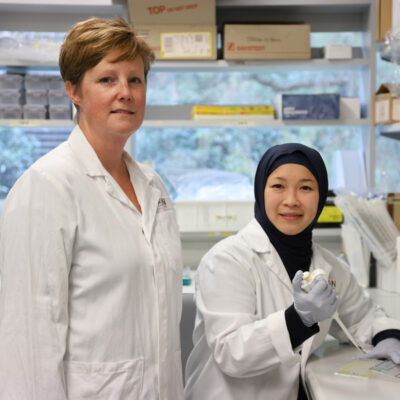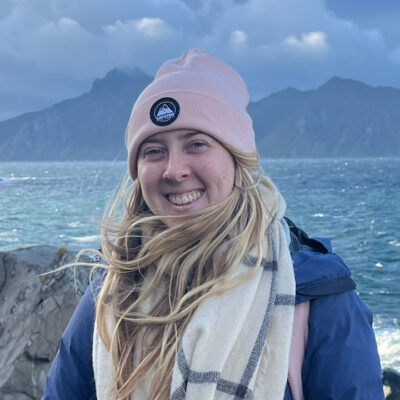Hudson Institute discovery could help ‘buy time’ during global avian influenza pandemic
By Hudson Institute communications
A team of researchers at Hudson Institute of Medical Research have found that timely blocking of the body’s own immune response to infection from a severe or pathogenic strain of influenza could be vital in treating patients infected during a global pandemic.
Strategies for halting the spread of a global influenza pandemic – such as an outbreaks of avian influenza in humans or that seen during the 1918-1919 Spanish Influenza in which at least 50 million people died worldwide – are limited.
A new study, led by Dr Ashley Mansell and Dr Michelle Tate, found that blocking the NLRP3 inflammasome, part of the body’s own immune response, at the height of infection from pathogenic strains of influenza staved off its deadly effects for up to two days, potentially giving the body a chance to fight back.
The study, the culmination of three years’ work by Dr Ashley Mansell’s team in Hudson’s Centre for Innate Immunity and Infectious Diseases, has been published in the journal Scientific Reports.
“The inflammasome is both ‘good cop’ and ‘bad cop’. It is a critical early response to influenza that helps our body to mature its immune response, clear the virus, and protect us from disease,” Dr Mansell said.
“The inflammasome is both ‘good cop’ and ‘bad cop’. It is a critical early response to influenza that helps our body to mature its immune response, clear the virus, and protect us from disease,” Dr Mansell said.
“When it is overstimulated by a deadly infectious disease, the inflammasome turns ‘bad cop’ and can unleash a ‘cytokine storm’ that actually works against us. The body burns up with infection from the inside, which can lead to organ failure and mortality.”
In 2013, Dr Mansell and his colleague Dr Julie McAuley from University of Melbourne discovered that a protein called PB1-F2, which is only found in its full-length form in pathogenic strains of influenza like avian flu (not common seasonal strains) overstimulates the inflammasome to unleash this cytokine storm.
In the most recent study, Dr Mansell’s team has now shown that blocking the inflammasome at the height of infection can actually ‘halt’ inflammation and offer some protection.
The team gave an inflammasome inhibitor called MCC950, created by Professor Matthew Cooper at the University of Queensland, to mice with strains of influenza A virus which mimic the strains of influenza in past pandemics.
They found that mice given the infammasome inhibitor during the initial stages of infection were hyper- susceptible to the deadly effects of virus. Mice that were given one dose of the inflammasome inhibitor when the infection was at its peak lived for an additional 48 hours, and the main signifiers of the virus (the ‘cytokine storm’ and lung inflammation) were also suppressed.
“Our team has shown that if we give an inflammasome inhibitor to mice with a highly virulent strain of influenza at the height of disease, we can block the effects for two days, giving the immune system a chance to kick in and reduce inflammation,” Dr Tate said.
“Buying additional time may allow the immune system to mature and hopefully resolve the infection.”
Global health organisations are currently monitoring a strain of avian influenza called the H7N9 viruses, which is transmitted to humans through contact with poultry. There have been 770 reported cases in China since March 2013, and the virus has a 38 per cent mortality rate in hospitalised cases.
The World Health Organisation has not ruled out human-to-human contact for a cluster of deaths which occurred earlier this year. A 2015 study in Nature suggested the rate of mutation of the virus means H7N9 should be considered a major candidate for a pandemic outbreak.
“We currently rely on three strategies during an influenza pandemic: vaccination which can take six to 12 months to produce and distribute; isolation; and anti-viral medications, which are really most effective if given in the first 48 hours of infection,” Dr Mansell said.
“An urgent unmet medical need still exists for patients who present with a fully progressed viral infection, particularly in the developing world, where access to anti-virals may be reduced.”
The finding may also have potential in other infectious diseases where the inflammasome NLRP3 plays a critical role in the body’s immune response, including
dengue fever, arthritis and even septic shock.
Dr Mansell says the next step is for scientists to create better inhibitors for NLRP3 to increase the war chest against potentially deadly infectious diseases like avian influenza.
“If we can develop targeted inhibitors that last for longer and have better efficacy, we could increase survival rates,” he said.
“The next step for the team is to explore the translation of this finding into potential clinical therapies.”
Contact us
Hudson Institute communications
t: + 61 3 8572 2697
e: communications@hudson.org.au
About Hudson Institute
Hudson Institute’ s research programs deliver in three areas of medical need – inflammation, cancer, women’s and newborn health. More
Hudson News
Get the inside view on discoveries and patient stories
“Thank you Hudson Institute researchers. Your work brings such hope to all women with ovarian cancer knowing that potentially women in the future won't have to go through what we have!”








